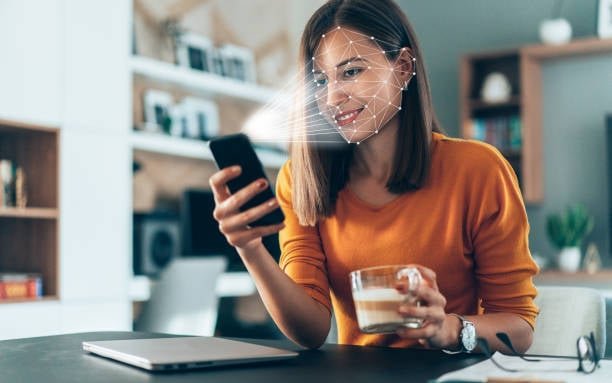Impersonation attacks and identity spoofing are significantly rising, causing companies to face extensive identity breaches due to these cyberattacks. In 2022, a report showed that cyberattacks have exploited 480,000 businesses. Companies must protect their services from such attacks by verifying the identities of every individual they deal with. They must implement advanced verification solutions to eliminate business contact with imposters. This can be done with the utilization of biometric face recognition solutions. The face recognition technology validates the customer’s identity after proper face verification, preventing imposters from impersonating the identities of legitimate customers and mitigating the occurrence of identity spoofs.
Biometric Facial Recognition – Mitigate the Presence of Impersonation Attacks
Biometric facial recognition is a digital authentication service that allows customers to be validated through face scanning. Companies can incorporate biometric identity verification solutions to mitigate impersonation attacks. Customers are verified by conducting a video screening, which captures their unique characteristics and stores them in the company’s database. This prevents imposters from impersonating the identity of legally verified individuals. The conventional verification methods entailed using alphanumeric passwords that were easily accessible by the imposter to commit identity theft. The biometric facial recognition does not require worldly passwords that customers tend to forget.
Face Recognition Technology – Incorporate 3D Liveness Detection for Secure Onboarding
Face recognition technology, specifically 3D liveness detection, utilizes artificial intelligence services to detect the customer’s facial features. The next step is to align the detected face to identify the consistency. After the alignment process, advanced technology is used to extract unique textures and facial characteristics, such as face height, nose shape, and distance between ears or eyes. The 3D detection system assigns some biometric template, which is a mathematical number, to every face, which contains encrypted codes to protect the privacy of facial information.
This facial biometric template information is stored in the company’s directories, which are later compared with other templates to identify the resemblance between two faces. This helps companies decide whether the two facial features are similar to one another or not. A large amount of similarity shows impersonation attempts, leading firms to prevent the spoof from manipulating the customer’s identity.
Face Recognition Deep Learning – Real-time Facial Recognition
Biometric face recognition services optimize deep learning, which uses extensive neural networks that allow biometric face ID checks to process advanced features of a customer’s face. Deep learning offers real-time facial verification, enhancing the processing speed and data accuracy. Real-time face identity verification can effectively utilize the deep learning algorithm to ensure precise recognition and analyze customer’s facial patterns and textures with accuracy. Like 3D liveness detection, deep learning technology enhances the face detection process by incorporating advanced encrypted codes that detect variations between similar faces, helping companies detect spoofing attacks.
AI Face Recognition Online – Password Free Use Cases
Artificial intelligence strengthens online face recognition as it can be used in various ways to conduct customer facial detection. Online face ID checks eliminate the need to use passwords for data protection, as passwords can frequently be forgotten. Instead, biometric recognition streamlines the customer experience by protecting personal information from illicit password attempts. Biometric face recognition can efficiently be used in the financial and healthcare sectors as both store susceptible information. These authentication services provide a seamless customer onboarding process while reducing identity theft risk. Financial institutions can authenticate customers’ identities during new account registrations, and the healthcare industry can secure patients’ information from imposters’ illicit attempts.
Facial Recognition Online – An Efficient Spoof Detection Process
Online biometric face recognition provides a systematic spoof detection service as it uses liveness detection to validate the variations in customers’ identities accurately. This service screens the spoofing entities using biometric templates. Spoofing detection can help the law enforcement sector in identifying criminals by matching the alleged criminal’s face with stored information in official directories. Government officials can use biometrics to locate lost individuals, whether they are children or the elderly.
Face checks secure financial accounts from unauthorized access by spoofing entities, enhancing a smoother working environment and protecting financial assets. Biometric verification services comply with the government regulations associated with KYC rules. This ensures that any company that uses biometric face detection protects organizational operations from money laundering while validating the customer’s identity accurately.
Summing It Up
Biometric face recognition provides an efficient solution to detect impersonation attacks. The face detection services identify the variations in facial features and eliminate the spoofing entities from accessing the company’s database. It conducts a thorough face detection process by assigning an encrypted code to each face, providing excessive protection from imposters. Online face detection helps the financial and healthcare sectors to secure customers’ confidential information from misuse, allowing them to have a streamlined customer experience backed with trust. It reduces the need to use passwords that can easily be accessed by imposters. So, it utilizes biometric verification for smooth identity validation.
Visit Blogest for more!

[…] of Mıllıeyt in Turkish culture and history. Learn why it is essential for understanding the identity and values of the Turkish […]
[…] Intelligence (AI) is taking personalization in customer support to the following stage. AI algorithms analyze sizeable quantities of facts to understand patron […]